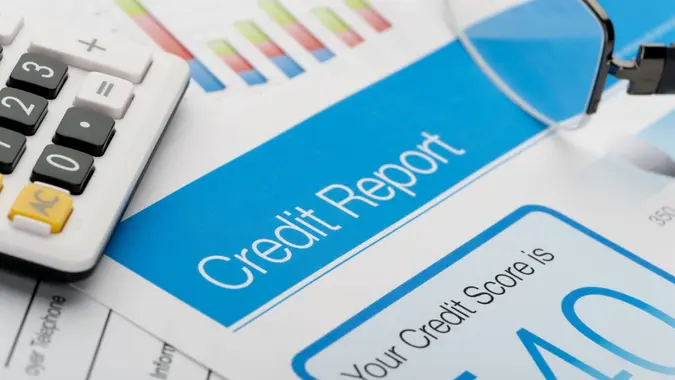Paying in Full vs. Partial Payments: Which Is Best for Your Credit Score?

Commitment to Our Readers
GOBankingRates' editorial team is committed to bringing you unbiased reviews and information. We use data-driven methodologies to evaluate financial products and services - our reviews and ratings are not influenced by advertisers. You can read more about our editorial guidelines and our products and services review methodology.

20 Years
Helping You Live Richer

Reviewed
by Experts

Trusted by
Millions of Readers
Making timely payments toward your credit cards and other debts and household bills is essential for keeping your credit report in good shape. Major credit bureaus factor in timely payments when calculating your credit score, including things like rent payments. For example, Experian uses an on-time rental payment system to include timely rental payments to establish your credit history.
When you’re managing your debt and money, you might wonder whether it’s worthwhile to pay off those credit balances in full or make partial payments that fit your budget. Here’s what you need to know about making payments to creditors when you want to improve your credit score.
Discover:
How Payments Affect Your Credit Score
The most widely used credit scoring system is FICO. Your FICO score is calculated from several factors that appear on your credit report. According to Fair Isaac, the makers of FICO, late payments will lower your FICO score, but a good track record of timely payments will raise your score.
When you’re trying to build or repair your credit, you need to make timely payments a high priority. Still, that’s not the only way to give your credit score a boost. If you have the means to do so, prioritizing full payments on your credit card debt could offer even more benefits.
Best Ways To Increase Your Credit Score Quickly
When your goal is to boost your credit score and impress a potential lender, the best thing you can do is focus on increasing your credit utilization ratio — an indicator of how much credit you have used compared to your total available credit. A low utilization ratio can boost your credit because this ratio makes up 30% of your credit score, advised a spokesperson for credit card products at Navy Federal Credit Union.
“The absolute fastest way to raise your credit score is to pay off all your debt or as much as you can. This is because payment history makes up 35% of your credit score [whereas] your credit utilization ratio makes up 30 percent.”
Should you pay a loan off before a credit card? Not necessarily. You’ll want to pay off all credit with the highest interest charges so you can clear the debt as quickly as possible. As your credit utilization ratio improves, you should see an improvement in your credit score
It’s also important to remember that your credit mix — the number of installment loans and credit card accounts that show up on your credit report — makes up 10% of your credit score. Paying off all your credit cards or installment loans quickly could raise your credit score because this behavior shows lenders that you can handle different types of credit. As long as you are paying these types of debts as quickly as possible, you could see your credit score rise.
When you aren’t maxing out your credit cards or showing a history of new loans on your credit report, you will appear to be less dependent on credit to get by. You’ll also want to take steps to avoid any missed or late payments. These are all good signs in the eyes of a lender and can have a positive effect on your credit score.
Full vs. Partial Payments: What Matters Most
When your goal is to lower your overall debt load, you need to figure out which type of repayment schedule will help you reach your goal as quickly as possible. Would you be more motivated to pay down debt when you have a fixed partial payment each month or are you disciplined enough to set aside funds for a full payoff in a few months? Only you can decide which method is right for you. The end goal is the same: to pay off as much as you can as quickly as possible.
Although making timely payments is always a good idea, you don’t want to overlook the benefits of paying off bigger chunks of debt — or all of your debt in full — to improve your credit score. Clearing your debt load quickly can help you clean up your credit report fast, and it has the added benefit of eliminating the risk of missed or late payments altogether.
More From GOBankingRates
- I'm a Shopping Expert: 9 Items I'd Never Put in My Grocery Cart
- 10 Cars That Outlast the Average Vehicle
- This is One of the Best Ways to Boost Your Retirement Savings in 2024
- 7 Things You'll Be Happy You Downgraded in Retirement
 Written by
Written by  Edited by
Edited by 
























